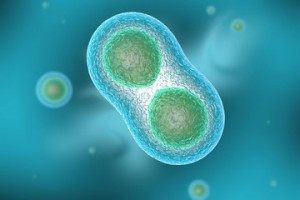
Dramatic amount of aging. Credit to Mary Jo Fohey (http://www.godsebook.org/political_leaders.html)
What popped into your mind when you first saw the picture to the left? Besides the amusement, I’m sure many of you thought about the horrors aging can do to people. But why exactly in terms of molecular cell biology are we all in the process of developing those depressing lines on our foreheads?
Normally, when a unicellular organism undergoes cell division, it divides in such a way that one of its two daughter cells receives mostly the old and damaged cellular material such as DNA, while the other daughter cell gets the majority of the newly synthesized cellular content.

Because of this uneven distribution of old and new cellular material, one of the daughter cells is always older than the other. According to previous studies, the cells that acquire the majority of old cellular material become slower in proliferating and carrying out metabolic activities, resulting in the phenomena of aging seen in research models such as E. coli bacteria. Because essentially all of the cells for most organisms divide in such way, aging is inevitable in our lives despite all the “anti-aging” products that we use!

Cell division of a single cell with replicated cell material. Credit to Roberto Piras from Shutterstock. (http://www.shutterstock.com/pic-141329944/stock-photo-two-cells-divide-by-osmosis-in-the-background-other-cells.html?src=tofjyodeYvtJcAapke2fzA-1-0)
However, one microbe seems to have managed to evade this depressing fate of aging. A recent study of the Max Planck Institute of Molecular Cell Biology and Genetics in Germany has identified a simple unicellular microbe, Schizosaccharomyces pombe, a yeast species, to be able to avoid aging. The researchers discovered that when growing under favorable conditions, S. pombe divides in a different way from other organisms. When S. pombe divides, both of its two daughter cells receive equal amount of the old and new cellular content. Thanks to this even distribution of damaged and newly synthesized cellular material, both of the two daughter cells are “younger than before,” as Iva Tolic-Norrelykke, one of the researchers of the new study said. In the study, the researchers found that since the daughter cells were younger than before cell division, S. pombe cells did not slow down in its proliferation and metabolic activities after dividing.
The new study did not, however, argue that S. pombe cells are immortal. Instead, it stated that if a S. pombe cell is followed for a long enough time, the cell will ultimately die, although “the probability of this death will [remain] constant” rather than increasing over time. The study also stated that if being put under stressful conditions, S. pombe cells tend to divide faster and consequently distribute old cellular material unevenly. And the daughter cells with more old material will ultimately die in the same way other types of cells age.
Aging is certainly an issue that is constantly on our mind. But instead of stressing about aging and perhaps therefore making our cells divide the old material even more unevenly, it is best that we be content with the way of life.
-By Connie (Kang Chi) Lee
References:

